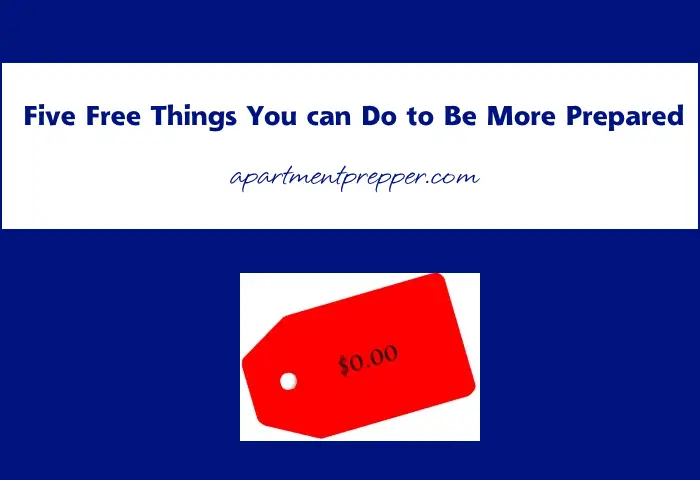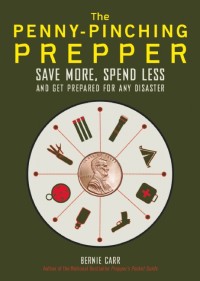This post is by Bernie Carr, apartmentprepper.com
The most obvious aspect of being prepared is the acquisition of supplies and gear. But that is not all there is to it. There are many things we can do that are just as important and should not be skipped in favor of the more exciting activities of buying beans, bullets or band-aids.
Here are 5 free things you can do to be more prepared
1. Take Inventory Make an inventory of everything you already have in terms of emergency supplies. Get a notebook and check all your hiding places. Separate your items into various categories:
- Water
- Food
- First Aid
- Lighting
- Fuel
- Cooking backup
- Safety/Defense
- Emergency Shelter
- Communications
- Go-Bag
- Cash
You might find you are already well prepared in one area such as First Aid, but lacking in others. How many days worth of water do you have? What backup water purification do you have? How much ammo do you have? Do you have a backup can opener? This is not an all-inclusive list but meant to get you thinking about where you are, so you can continue in your progress.
2. Back up phone numbers and addresses We’ve all become too reliant on our smart phones to tell us our contact phone numbers, addresses, directions and a host of other important information. Make a list of all important phone numbers and addresses both online and on a paper backup. Most people are dependent on their cell phones to look up any phone number, including their closest loved ones. It is the easiest thing to do. But what if you can’t access your phone’s address list for some reason? I realized this when my phone got completely drained one day. I wanted to make a phone call from the work phone but the number was stored in the cell phone, which refused to turn on until it was sufficiently charged. After that incident, I resolved to have backup sources for contact information. Plan to update your backup lists at least twice a year: such as soon after New Years Day and around Independence Day or any dates that are easy for you to remember.
3. Make a detailed family emergency plan. This involves some information gathering as well as planning. Do you know your spouse’s schedule, as well as the kids’ school schedules? Find out your office or schools’ emergency plans. If an emergency happens in the middle of the day, make a plan on who will pick up whom and where the family will meet. Write down the plan and post it on the bulletin board or refrigerator within easy reach.
4. Learn one preparedness skill every month. Start with basics such as water purification, fire starting, etc. Many of these processes can be done with items you already have around the house.
5. Evaluate the current security and safety plans in your home or apartment. Go outside your home on a random day and look for weaknesses. Are the windows wide open and anyone can see your belongings inside? If a stranger approaches the door, will one of the children open it without checking with an adult? There was an incident in the local area not too long ago when a teenage girl opened the door without checking when the doorbell rang. Three thugs rushed her; she screamed, the mom rushed out and ended up getting shot. It is never too early to teach kids to be wary of strangers. Get the family together and discuss safety plans.
I know this list is not the most exciting part of prepping but they are important activities nonetheless. It does not always have to cost money to become more prepared.
© Apartment Prepper 2016
Updated from a previous post that was originally published on Oct 25, 2011.
For more preparedness tips that are budget friendly, read my book:



Possible dates someone could use as a reminder to backup phone numbers / addresses: clock changes (March, November) or beginning/end of hurricane season (June, end of November).
Another thing that should be backed up on paper, in my opinion, is important websites (bank, work, insurance, etc…) in case you find yourself without access to your own computer and/or devices, but can use someone else’s. Yeah, you could Google the sites, but I think it would be easier if you had that information already on hand.
retnavybrat, Great idea, I need to backup my websites as well. Thanks for the comment!